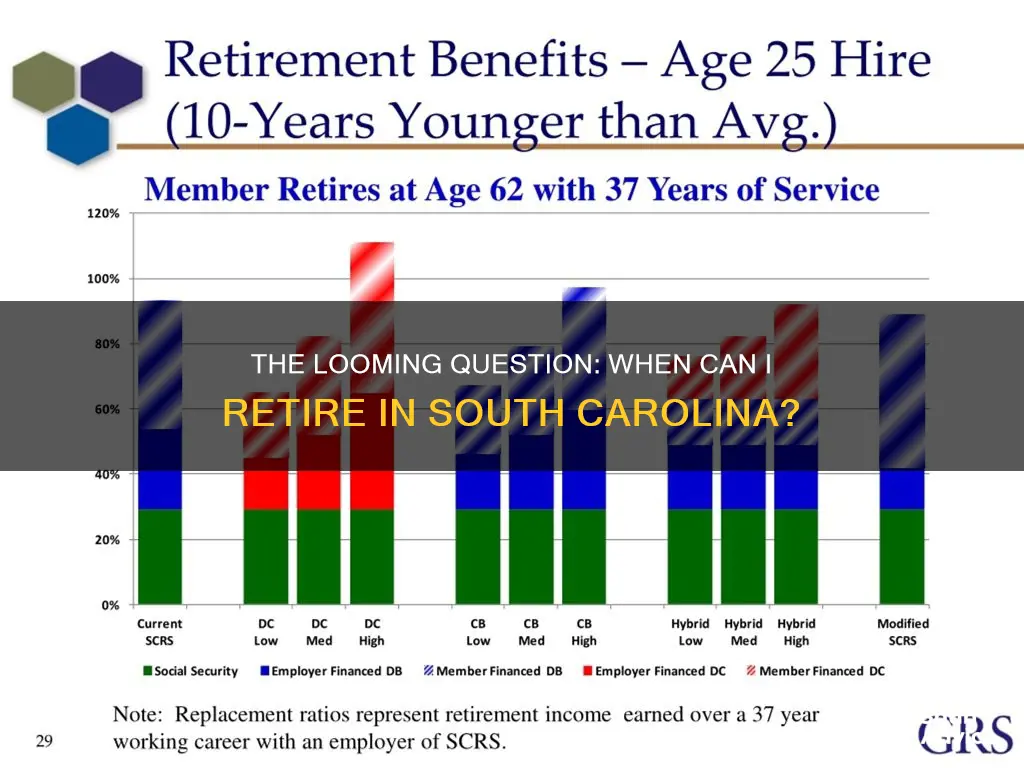
South Carolina offers a defined benefit retirement plan for state and local government employees, known as the South Carolina Retirement System (SCRS). This plan provides a fixed monthly benefit based on factors such as average final compensation and years of service. To be eligible for SCRS, individuals must be employed by a participating employer and contribute 9% of their gross pay on a tax-deferred basis. Regular county employees in South Carolina become vested in the system after eight years of full-time service and can retire with unreduced benefits at age 65 or with 28 years of service. The state also offers other retirement systems for specific groups, such as law enforcement and judges, each with its own contribution and benefit structure. South Carolina is considered a tax-friendly state for retirees, exempting social security benefits from taxation and offering deductions for individuals over 65.
| Characteristics | Values |
|---|---|
| Retirement System | South Carolina Retirement System (SCRS) |
| Who is it for? | Employees of state agencies, public and charter school districts, public higher education institutions, and other local subdivisions of government that have joined SCRS |
| Contribution | 9% of gross pay |
| Interest | 4% interest compounded annually |
| Retirement age | 65 years or older |
| Early retirement | 60 years or 55 years with 25 years of service |
| Minimum years of service | 8 years |
| Reduced monthly retirement benefit | 28 years of service |
What You'll Learn

Retirement benefits for Class Two and Class Three members
The South Carolina Retirement System (SCRS) is a defined benefit retirement plan for employees of state agencies, public and charter school districts, public higher education institutions, and other local subdivisions of the government. The plan assumes life expectancy and investment risk.
Class Two Members
Class Two members are those whose membership was effective prior to July 1, 2012. To retire and receive an unreduced monthly retirement benefit, you must have 28 years of service or be aged 65 or older. Early retirement is also possible at age 60, or at age 55 with 25 years of service, but this comes with a reduced monthly retirement benefit. To receive any benefit, you must have at least five years of earned service.
Class Three Members
Class Three members are those whose membership was effective on or after July 1, 2012. To retire and receive an unreduced monthly retirement benefit, your age and years of service must total 90, or you must be aged 65 or older. For example, if you begin covered service at age 22 and work continuously for a covered employer, you would be eligible for service retirement once you reach 56 years of age and have 34 years of service credit. Early retirement is possible at age 60, but this comes with a reduced monthly retirement benefit. To receive any benefit, you must have at least eight years of earned service.
General Information
All SCRS members contribute a tax-deferred 9% of gross pay. Accounts earn 4% interest compounded annually until retirement or account inactivity. The monthly retirement benefit is based on a formula (1.82% of average final compensation multiplied by years of service) and is payable until death. There are three payment options available, two of which provide survivor protection.
Smart Ways to Invest $2000
You may want to see also

Retirement eligibility requirements
South Carolina has six different iterations of its base retirement system, each catering to different types of local and state employees. The South Carolina Retirement System (SCRS) is a defined benefit retirement plan for employees of state agencies, public and charter school districts, public higher education institutions, and other local subdivisions of government that have joined SCRS.
To be a member of the SCRS, you must be employed by and compensated by an employer that participates in the system. Membership is divided into two classes: Class Two and Class Three.
Class Two Members:
- Membership effective prior to July 1, 2012
- You can retire and receive an unreduced monthly retirement benefit after 28 years of service or at age 65 or older
- You can retire early at age 60, or at age 55 with 25 years of service, and receive a reduced monthly retirement benefit
- You must have at least five years of earned service to receive a benefit
Class Three Members:
- Membership effective on or after July 1, 2012
- You can retire and receive an unreduced monthly retirement benefit once your age and years of service total 90, or at age 65 or older
- For example, if you begin covered service at age 22 and work continuously for a covered employer, you would be eligible for service retirement once you reach 56 years of age and have 34 years of service credit
- You can retire early at age 60 and receive a reduced monthly retirement benefit
- You must have at least eight years of earned service to receive a benefit
Other Retirement Systems in South Carolina:
Police Officers Retirement System (PORS):
- For members of the police of participating local subdivisions, firefighters, peace officers, probate judges, magistrates, and coroners
- Employees contribute 9.75% of their salary to their retirement
- Offers accidental death protection, disability protection, annual benefit adjustments, early departure benefits, etc.
Judges and Solicitors Retirement System (JSRS):
- For members of the South Carolina Supreme Court, judges in various courts, solicitors, and public defenders
- Members must contribute a tax-deferred 10% of their pay
- Includes incidental death benefits, disability benefits, service purchase options, and possible benefit adjustments
General Assembly Retirement System (GARS):
- For members of the general assembly elected before November 2012
- Requires a contribution of 11% of pay, the largest percentage of any retirement system in South Carolina
- Includes standard disability and in-service death benefits, as well as a formula-based monthly distribution calculation
South Carolina National Guard Plan (SCNG):
- For National Guard members who served at least 15 of their 20 years in South Carolina, including the last 10
- Members must be at least 60 years old, be discharged honorably, and have a minimum of 20 years of total service
- This plan is meant to augment the existing federal plan, with benefits ranging from $50 to $100
State Optional Retirement Program (ORP):
- For those eligible for the SCRS and working for a participating employer
- A defined contribution plan that allows participants to customize their retirement plan, deciding how much to contribute and how to invest their money
Lucrative Investments Offering 3% Returns and Beyond
You may want to see also

Retirement tax rates
South Carolina is considered a tax-friendly state for retirees. While the state does not tax Social Security retirement benefits, it does partially tax retirement income. However, individuals aged 65 and above can claim deductions on their retirement income.
Retirement Income Deductions
Taxpayers under 65 years of age can claim a $3,000 deduction on their retirement income, while those 65 and older can claim up to $10,000. This deduction can be applied to various retirement income sources, including pensions, 401(k)s, IRAs, and other retirement accounts. Additionally, seniors can claim up to $15,000 in deductions from South Carolina's state income tax.
Homestead Exemption
The Homestead Exemption is a significant benefit for retirees in South Carolina. Homeowners aged 65 and older can apply for an exemption on the first $50,000 of their home's value, leading to substantial savings on property taxes. South Carolina already has some of the lowest property taxes in the country, with an average effective property tax rate of 0.56%.
Retirement Systems in South Carolina
The state offers several different retirement systems for various types of local and state employees, including the South Carolina Retirement System (SCRS), the Police Officers Retirement System (PORS), and the Judges and Solicitors Retirement System (JSRS), among others. Each system has its own contribution requirements and benefits. For example, participants in the SCRS contribute 9% of each paycheck, while those in the JSRS must contribute 10% of their pay.
Retirement Planning
Even with the tax benefits offered by the state, it is essential to have a comprehensive retirement plan in place. Combining your retirement savings with Social Security can help ensure a more secure financial future. Consulting with a financial advisor can be beneficial to navigate the different retirement systems and make informed decisions.
Property Rights: Investment's Foundation
You may want to see also

Retirement income and deductions
In South Carolina, for example, there is a $3,000 tax deduction for residents under 65 years old, and a $15,000 deduction for those 65 and older. The state also has six different iterations of its base retirement system, depending on the type of employee. For instance, the South Carolina Retirement System (SCRS) is for employees of state agencies, public and charter school districts, and public higher education institutions. The Police Officers Retirement System (PORS) applies to members of the police, firefighters, peace officers, probate judges, magistrates, and coroners.
The South Carolina Retirement System is a defined benefit retirement plan. This means that members receive a fixed monthly benefit based on a formula that includes average final compensation, years of service credit, and a benefit multiplier. Members contribute 9% of their gross pay, and their account earns 4% interest compounded annually. To be eligible for an unreduced monthly retirement benefit, Class Two members (those who joined before July 1, 2012) must complete 28 years of service or reach the age of 65 or older. Class Three members (those who joined on or after July 1, 2012) can receive an unreduced monthly benefit when their age and years of service total 90, or when they turn 65 or older.
It's important to note that retirement income and deductions can be complex, and they may change over time. Therefore, it's always a good idea to consult official sources and seek professional financial advice to understand your specific situation.
February: A Month for Investing?
You may want to see also

Retirement communities in South Carolina
South Carolina is a popular place for retirement, with its beautiful beaches, outdoor life, and favourable tax policies. The state offers a range of retirement communities, from those with a focus on outdoor activities to those with more of a social focus.
Outdoor Activities
South Carolina's retirement communities offer a range of outdoor activities. For those who enjoy the water, there are numerous coastal communities, such as those in Bluffton, Hilton Head Island, and Myrtle Beach, which offer boating, fishing, and other water sports. For those who prefer land-based activities, there are communities with golf courses, such as the Sun City Hilton Head community, which offers 36 holes of championship golf, and the Kiawah Island community, which offers seven golf courses. There are also communities with walking and biking trails, such as the Aiken community, which has over 2,800 acres of rolling countryside.
Social Activities
For those looking for a more social lifestyle, there are retirement communities in South Carolina that offer a range of social activities. For example, the Latitude Margaritaville Hilton Head community, inspired by Jimmy Buffett, offers live music daily in the middle of Latitude Town Square. The community also has a large town centre with food, shopping, and entertainment. The Del Webb Charleston community in Summerville is one of the most luxurious in the state, offering a range of social amenities, including clubs, events, and activities.
Healthcare
Access to quality healthcare is an important consideration for retirees. South Carolina offers great hospitals and specialised medical centres. The state has 65 hospitals, including nationally ranked options and many others that meet national standards of excellence. Some specific examples of quality healthcare facilities near retirement communities include:
- Summerville Medical Center, which is a 30-minute drive from the K. Hovnanian's® Four Seasons at Lakes of Cane Bay community
- Grand Strand Medical Center, which is near the Del Webb at Grande Dunes Myrtle Beach community and is a top cardiac hospital in South Carolina
- Hilton Head Regional Hospital, which is near the Hilton Head Plantation community and has won multiple awards, including for Patient Safety Excellence
Cost of Living
The cost of living in South Carolina is right about the national average. However, South Carolina's taxation policy for retirees is among the best in the nation. Social Security benefits are exempt from tax, property tax is low, and there is no estate tax. The average cost of living in different areas varies, with Beaufort County (Hilton Head Island) costing about $4,900 per month, and Myrtle Beach costing about $4,000 per month.
Options: Why Investors Are Wary
You may want to see also
Frequently asked questions
For members of the South Carolina Retirement System (SCRS), you need a minimum of 5 years of earned service to receive a benefit. However, to be eligible for full retirement benefits, you need to have worked for 28 years or until you are 65 or older.
The amount of money needed to retire comfortably in South Carolina depends on several factors. According to a study by GoBankingRates.com, a personal finance website, the minimum amount needed for 25 years of retirement in South Carolina is $823,890, and for 30 years, it is $989,658.
Employees in South Carolina typically contribute 9% of their salary towards their retirement. However, this may vary depending on your specific retirement system and employer.
Yes, South Carolina is considered a tax-friendly state for retirees. Social Security benefits are not taxed, and individuals aged 65 and older can claim deductions on their retirement income and property taxes.
In addition to tax benefits, South Carolina offers a low cost of living, favourable weather, outdoor leisure activities, cultural attractions, and access to world-class hospitals and medical specialists.







